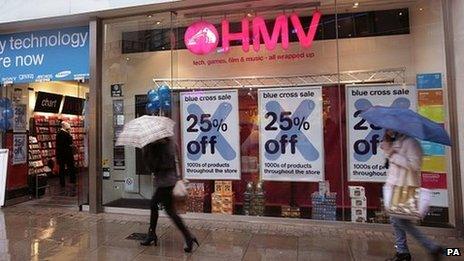HMV: A tragedy or fresh start?
- Published

HMV currently has 239 stores and employs about 4,350 people
Ninety-two years after its first store appeared, HMV, Britain's last major music and entertainment chain, has gone into administration.
Many fans still hold a soft spot for record shops and HMV accounted for 22% of music and video sales in 2012, according to Verdict Research.
So what went wrong, and what will it mean for music lovers and the music and DVD industries?
Steve Lamacq, BBC 6 Music DJ
"There always used to be a time when you would bump into John Peel down there, making a regular pilgrimage to HMV," Lamacq says. "We used to buy a lot of records from HMV.
"But since it began to move towards being an entertainment supermarket, the selection of material on offer for a bloke such as myself began to shrink.
"It doesn't feel like a record shop when you walk in. If you're looking for the reggae section at HMV, you have to go through games, past the remaindered books, then into the T-shirt section, then past some weird gadget shop - and you eventually find yourself by metal and reggae, hiding in a corner just behind.
"In the end, you think 'you're dedicating more space to things I can listen to music on, rather than the music itself'. That was weird.
"I think the real concern is what happens to the crossover artists - the ones who were new bands, being sold in independent record stores, who moved up a level. Stuff that people have never heard of that turns up at the Brits, or records that get nominated for the Mercury.
"Where will you find those records? Where are you going to break those artists that come from outside the mainstream and cross into the mainstream?
"It's a huge gap between the indies and the supermarkets - and that's the gap HMV fills."
Martin Mills - Beggars Banquet
"It's a sad day when a historically great music retailer like HMV finds itself in this position," says Mills, who is founder, owner and chairman of Europe's largest independent record label network, Beggars Group.
"But it's obviously at the mercy of other tides surging around it, as with Virgin France and Fnac in Italy.
"We'd hope that out of the administration process will come a leaner and stronger music retailer. Music does still sell, and sell well, not just in digital but also in physical form, and there clearly is a future in selling it, as stores as varied as Rough Trade in the UK (and soon in the USA) and JB Hi-Fi in Australia prove every day.
"Retail worldwide is clearly going through an enormous shake out, but it's important to note that there are many success stories out there, and we look forward to being part of making sure that music is one of them."
Chris Cooke - CMU music industry newsletter
HMV is still an "incredibly valuable brand" and is likely to survive in some form, albeit with many fewer than its current 239 stores, Mr Cooke believes.
"The brand is very powerful. Whether or not it's powerful on the high street… I could see maybe a 40-store network coming out of this but that probably would be a best case scenario."
The question now is how bad the news will be for the music and DVD industries, who have bailed HMV out in the past and are keen for a high street chain to remain, he says.
"The record industry in America hasn't really had a big high street chain for a few years now and it has survived."
Andy Heath, UK Music chairman

HMV, with mascot Nipper the dog, has been on the high street since 1921
The news about HMV has been met with "a mixture of sadness and a little element of relief", says Mr Heath, who is chairman of the British music industry body UK Music.
"This has been a long time coming - there's been a lot of speculation about the destiny of HMV for a long time and it's been a tricky period for them and for us," he says.
The music industry no longer relies on high street stores, he says. "We certainly want stores in high streets to fulfil the demand. The physical business is approximately half of our overall business, digital business is the other half and HMV certainly wasn't all of the physical business.
"We don't need it but we sure as heck want it, and I believe that it will be there because there are a huge amount of people who go into HMV day in day out and buy a lot of CDs."
There is room for a high street retailer that can be "focused in a way that HMV was unable to be focused", Mr Heath adds.
"HMV was a legacy business operating under different market circumstances 20 years ago and it found itself in a place with leases and so on where it was unable to be as agile as it needed to be to survive, but fundamentally there's a very decent business there."
Andrew Harrison, Q magazine editor
The demise of HMV is "a real tragedy", Mr Harrison says.
"HMV was the gateway drug for record buying. It's certainly the place where I learned the joys of browsing and nosing around, and you discover other smaller retailers and you become a habitual music buyer."
It is more difficult to discover interesting new music when shopping for music online, he says. "You have to know what you're looking for. Somebody once described listening to iTunes as like listening to a spreadsheet. It lacks a bit of romance.
"Whereas if you're in a record shop, even one like HMV, which people did think was a bit corporate, you're still going to have surprises or be inspired by an amazing record sleeve or just a special offer.
"I also think it's worth recognising all we've heard in recent months about large multi-nationals not paying their tax - well, HMV was a good corporate citizen.
"People complained that its CDs were expensive - well perhaps it's because it paid its tax. We can't have our cake and eat it."
Mark Kelly, Marillion
Marillion still sell most of their music in physical formats, according to keyboardist Mark Kelly, who is also a member of the artists' lobby group the Featured Artists' Coalition.
"The average age of our audience is the CD generation or even the vinyl generation, that means they prefer to buy CDs," he says.
"The CD's not dead yet. We sell a lot of CDs from our website but we also rely on retailers to sell them as well. So it's going to have a bad effect."
The government should have acted faster to close the VAT loophole that allowed mail order companies to import cheaper CDs and DVDs from the Channel Islands, he says.
But he adds: "Personally, I think it's a sign of the times. You can't turn back the clock. Everybody buys online now. I'm a big fan of Amazon and online retail because it's so convenient and so I'm sure it's here to stay."
Kim Bayley, Entertainment Retailers' Association
"No one can say this is a surprise, but it is still a shock," Mrs Bayley says.
"It would be wrong to underestimate the affection which HMV is held by consumers and the determination of music and video companies to see HMV survive in some form.
"Both music and video companies are painfully aware of the consequences of losing a retailer responsible for around a third of UK physical music and video sales. We have to hope they will not stand by and watch HMV go down.
"HMV going from the high street is in the interests neither of consumers nor of suppliers.
"We believe it is possible for the administrators to rescue something out of this situation. There is a precedent that you can streamline your costs and in particular the number of stores a chain trades from and still retain the bulk of sales - that's precisely what happened with Game."